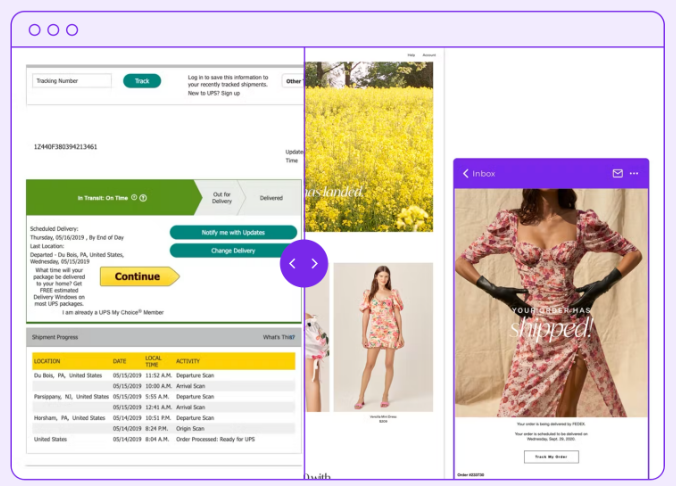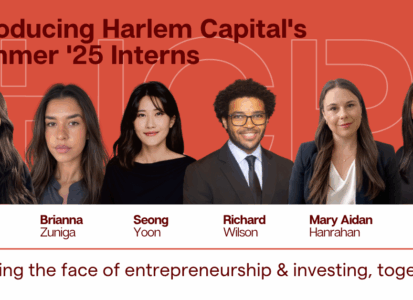HCP Founder Spotlight – Malomo
by Harlem Capital

HCP introduced the Founder Spotlight Series in August 2021 to highlight our exceptional founders who are changing the face of entrepreneurship. Our Founder Spotlight series continues with Yaw Aning, Co-founder and CEO of Malomo.
This interview has been edited and condensed for clarity.
Yaw shares the origin of Malomo, how his product has helped ecommerce businesses grow, and what drives him as a founder.
HCP: Tell us a little bit about yourself and your professional background.
Yaw: I studied civil engineering in school because I really loved the intersection of art, math, and science. I wanted to start a company but knew it was going to take a long time to launch a civil engineering company. I discovered tech and felt like it had the same kind of blend of art, math, and science. I got into a two-year fellowship in investment banking, specifically doing corporate finance and M&A advisory work for tech companies. I left after two and a half years and started a tech company in the online education space, which after a lot of twists, turns, and learnings, ultimately failed.
Then I launched a consulting business where we worked with a lot of early-stage companies on building zero to one tech products. During that time I worked with Shopify merchants so we got a really nice education in how ecommerce works and a lot of the learnings that we got from that are what inspired Malomo.
HCP: Can you share more about that journey to building Malomo?
Yaw: We saw through our consulting clients that Shopify made it super easy to design beautiful buying experiences, but all of the problems typically emerged after the buy button. The number one support ticket merchants would get was customers asking where their order was. We thought it was super interesting that the merchant handed over the customer experience to a company like FedEx or UPS, but customers would still go to the merchant for order delivery complaints. We wondered if we could build a platform to help give both merchants and consumers transparency about their orders.
We had a little bit of an aha moment going down that journey, which was that consumers love to know where their packages are so they check tracking a lot. Every merchant is looking for an edge on how they can continue to grow their brand and drive repeat purchases. We thought there was an opportunity to turn order tracking into a marketing channel and actually drive growth for the merchant. So we combined the two concepts into one and Malomo was born.
HCP: Digging deeper into the product, how exactly does Malomo work?
Yaw: We sit at the intersection of a couple of major platforms within the ecommerce merchant’s tech stack. We connect into the cart platform like Shopify, carriers like FedEx and UPS, and marketing tools like Clayvio or Postscript. This allows merchants to create proactive messages based on the order moving in transit.
We also host a tracking page that serves as the hub for the merchant to communicate and build a stronger relationship with the consumer. So instead of the customer going to the carrier website and looking up their order, we replace that entire experience with a custom branded tracking page through which the merchant can engage customers with other content like product upsells based on their buying or viewing history, or content about the brand, like videos from the founder or educational tips about how to use the product.

HCP: Do you have some specific customer success stories that you might be able to share from customers that have been using your product and seen growth?
Yaw: One retailer that we work with is called For Love and Lemons. They’re an apparel fashion retailer. They use the post-purchase experience as a marketing and sales channel in two super creative ways.
First, when they send proactive email notifications about your order in transit, they’ll show really beautiful imagery around collections that they’re launching or new collections that they’ve recently launched. It’s a really subtle, but nice way to give you visibility into their entire product catalog.
Second, they use their tracking experience to highlight things like upcoming sales. So if you are a customer you can be in the know about a secret sale and be alerted about that first. It gives a layer of exclusivity to your existing customer base and makes you feel a little bit more appreciated and connected to the brand.
In their first two or three months on the platform did $100,000 in repeat revenue from customers clicking through on the tracking experience and buying more products, which is pretty incredible.
HCP: That’s amazing! Those emails must have a higher click-through rate than other marketing emails that companies send, right? So you’re unlocking that power.
Yaw: Exactly right. Order emails typically see a 3x higher open rate than marketing emails, partly because people care where their packages are but also because they are transactional, so they have different deliverability than a marketing email. You can’t unsubscribe from them and they go directly to the inbox instead of a promo tab or spam folder.
HCP: Ecommerce sales have increased significantly during the pandemic. How has that impacted the trajectory of your business overall?
Yaw: Yeah, it’s been kind of amazing to watch. We’ve grown almost 4x year over year for the last two years which is pretty insane growth and definitely keeps things entertaining and exciting inside the company.

The growth has been interesting too. COVID happened and having a good shipping experience went from a nice to have to a strategic imperative. Now a year later we’re dealing with global supply chain issues and crises and the growth is fluctuating where some merchants weren’t able to get supply in and their businesses went under and some planned for this, and they took off.
HCP: Pivoting a little bit, what led you to be interested in partnering with Harlem Capital?
Yaw: There are a lot of reasons. One of the things that always stuck out to me is their mission, to create the most diverse millionaires. As a founder of color, how can you not get behind that?
Another thing that stuck out to me about them is their trajectory. They’re masters at PR and storytelling. You don’t only want to partner with a fund because of a mission, it’s also how the fund is going to support you as a founder as you grow and mature as a company. They’ve just done a lot to support me. They’ve provided tons of resources to help scale our business. The level of support they provide is unparalleled. I can pick up the phone or send them an email or text and I know I’m getting a reply back.
The last thing is they demystify not just the company building, but the venture side of the business. I think it is really important for founders to know how money works when you’re building a venture-backed business and the expectations of founders. I think they do a great job of level setting and sharing that information freely. So we all as founders have an equal playing field. When we’re going out and raising funds in working with investors, we’re well equipped to make the right decisions there.
HCP: On that note what advice do you have for founders who are just starting their companies?
Yaw: I’ll share two. One of the main advantages that you have as an early-stage startup if you’re in a space where there’s an incumbent or a healthy amount of competition, is that the person that moves the fastest tends to win the market. However, if you have a vision of what the product will look like years down the line, it’s really hard to reconcile that future state with where you are today. We always preach to build as little as you can. Actually don’t build a product if you can help it. Use off-the-shelf software and try to consult and solve the problem for your customer that way, so you get the insights you need to build your product and get to market fast.
The second piece of advice is to choose the right partners. The right partners can make or break you early on. That goes for everything from your co-founders, to employees, to partners in the ecosystem, to your investors and advisors. Choosing the right ones early on has an outsized impact on future growth.
HCP: What motivates you and why?
Yaw: I lost both of my parents before I turned 30. Both my parents were very entrepreneurial. My mom battled a very rare form of cancer for five or six years. Over time she lost her ability to walk on her own and had to stop working. My dad took my mom to treatments and sacrificed a ton with his job and his work. My mom got really into soap-making just to pass the time and keep her mind busy. When she was going through treatments she’d hand out soap from her latest batch to the people who would come and visit her and I could just see the joy on her face when that happened. The ability to build those connections and relationships with people was the most important thing and that happened a lot of times because of people coming and just checking up on her and hearing about her latest soap-making adventures. She called that soap company Malomo.
When my mom passed, we wanted to honor her name and her legacy. My dad passed about two years later, unexpectedly traveling overseas, the same year that he retired. Both of them meant a lot to me. I could see the love that they had for each other, for people in their lives, and for me and my siblings. So that’s the driving motivation every day: waking up, making them proud, and honoring them through this business.
HCP: I’m really sorry to hear about your loss. They would be really proud of what you’re building, it’s a beautiful way to keep that energy and spirit alive.
If you weren’t the CEO of Malomo, and you could do anything in the world, what would you be doing instead?
Yaw: I’d probably work on a nonprofit in the children’s oncology or cancer space. I watched how difficult battling cancer was for my mother mentally, physically, emotionally, and spiritually. She was in her late 50s when she passed. I can imagine how traumatizing it would be for kids going through that experience. I would want to do something there to help you know, ease their pain or, or give them a moment of freedom through entertainment or something like that.
HCP: Where can readers learn more about your business? Plug your socials!
Yaw: You can visit gomalomo.com or find us on Twitter, Instagram, Facebook, and LinkedIn.


